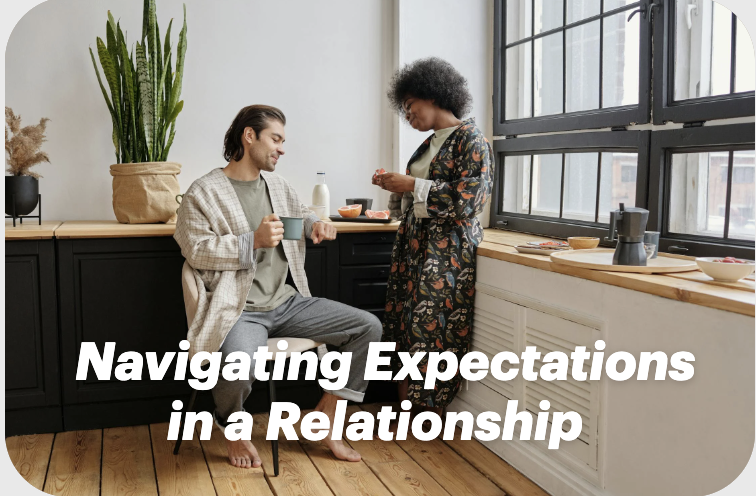Expectations can be the glue that holds a relationship together—or the wedge that drives two people apart. We all have them, whether we realize it or not. It’s natural to hope for certain things in a relationship: love, support, understanding. But when expectations go unspoken or misaligned, they can create unnecessary tension and disappointment.
I’ve been there myself, struggling with expectations that felt impossible to meet, both for myself and for my partner. And yet, I’ve also seen how honest conversations and meeting someone who truly aligns with my values can change everything. So, let’s dive into what expectations in a relationship really mean, how to navigate them, and how you can find a partner who genuinely gets you.
Table of Contents
Why Expectations Matter
Common Relationship Expectations (What’s Reasonable vs. What’s Not)
When Expectations Go Too Far
My Personal Journey with Expectations
How to Balance Expectations in Your Relationship
Finding Someone Who Matches Your Energy
Conclusion: Embracing Realistic Expectations
Why Expectations Matter
Expectations aren’t inherently bad. In fact, they’re essential to a healthy relationship. They help define what we need and want, and they set the foundation for mutual respect and understanding.
Think about it: If you didn’t expect trust or loyalty in a relationship, how would you know if something felt wrong? If you didn’t expect clear communication, how would you handle conflict? Expectations give relationships structure—but only when they’re realistic and communicated openly.
On the flip side, when expectations are left unspoken or become unrealistic, they can cause frustration and confusion. For example, expecting your partner to read your mind about what’s bothering you. That’s bound to lead to misunderstandings. Or expecting your partner to change everything about themselves to fit your ideal image? That can only lead to resentment.
Quick Insight:
Healthy expectations, like emotional support or mutual respect, help a relationship thrive. Unrealistic ones, like expecting someone to meet all your needs all the time, create unnecessary stress.

Common Relationship Expectations (What’s Reasonable vs. What’s Not)
Let’s break it down. Here are some common relationship expectations, with a little perspective on what’s reasonable and what might need rethinking:
- Emotional Support
- Reasonable: Expecting your partner to be there for you during tough times, offering a listening ear and empathy.
- Unreasonable: Expecting them to always have the perfect solution to your problems.
- Trust and Loyalty
- Reasonable: Expecting honesty and commitment in a relationship.
- Unreasonable: Expecting your partner to never make a mistake or slip up—people are human.
- Communication
- Reasonable: Expecting open and respectful communication to resolve issues.
- Unreasonable: Expecting instant replies to every text or call, 24/7.
- Shared Goals
- Reasonable: Wanting a partner whose values and long-term goals align with yours (e.g., starting a family, career ambitions).
- Unreasonable: Expecting your partner to adopt all your dreams as their own.
The key here is to identify what truly matters to you and focus on those core expectations, rather than trying to create a perfect fantasy relationship.
When Expectations Go Too Far
Here’s the hard truth: sometimes, we unknowingly set ourselves up for disappointment by expecting too much—or expecting things we haven’t communicated.
I used to think that if someone really loved me, they’d automatically know what I needed without me saying a word. When they didn’t meet those expectations, I felt hurt and unimportant. But the reality was, I had never voiced my needs. How could they have known?
Expectations can also go too far when they’re based on societal pressure or unrealistic ideals. For example, I used to believe that my partner needed to fit into a specific mold: they had to have a great career, always know the right thing to say, and share all of my hobbies. Looking back, I realize I was setting myself up for failure. No one could meet those expectations, and honestly, I couldn’t meet them for anyone else, either.
My Personal Journey with Expectations
Let me share something personal. When I first started dating, I thought relationships were all about finding someone who checked every single box on my “ideal partner” list. But what I didn’t realize was that my list was built on impossible standards.
I wanted someone who was spontaneous but also responsible, romantic but not cheesy, ambitious but never too busy for me. Sound familiar? It was exhausting—for me and anyone I dated.
Then, I found MixerDates. At first, I was skeptical about online dating, but what stood out to me about MixerDates was its emphasis on real connections. Unlike other platforms where it felt like a never-ending swipe game, MixerDates encouraged genuine conversations.
On my first date through the site, I met someone who didn’t check all my boxes, but who surprised me in the best way. We didn’t have to guess each other’s expectations because we talked about them—openly and honestly. That’s when I realized that relationships aren’t about perfection; they’re about compatibility and understanding.
How to Balance Expectations in Your Relationship
Over time, I’ve learned that managing expectations isn’t about lowering your standards—it’s about approaching them with clarity and empathy. Here are some tips I’ve picked up:
- Be Honest with Yourself
Take a step back and ask yourself: What are my non-negotiables? What truly matters to me in a relationship? Separate the “must-haves” from the “nice-to-haves.”
- Communicate Early and Often
Don’t wait months to bring up something important. If you expect open communication or shared financial responsibilities, talk about it early on.
- Accept Differences
No two people are the same, and that’s okay. Instead of expecting your partner to mirror you, focus on how your differences can complement each other.
- Practice Empathy
Try to see things from your partner’s perspective. If they fall short of your expectations, ask yourself: Was my expectation fair or realistic?
- Grow Together
A healthy relationship is one where both people are willing to learn and grow. Instead of forcing someone to meet your standards, work together to build a partnership that feels good for both of you.

Finding Someone Who Matches Your Energy
One of the biggest lessons I’ve learned is that expectations feel a lot easier to navigate when you’re with someone who naturally aligns with your values.
That’s why finding the right person matters so much. And honestly, it’s why MixerDates made such a difference for me. The platform connects people based on shared goals, values, and interests—so you’re not wasting time on mismatched connections.
When I met my current partner through MixerDates, it felt refreshing. From our first conversation, I could tell we were on the same page about what we wanted in a relationship. It wasn’t about playing games or hiding our intentions; it was about being real.
CTA (Subtle): "If you’re ready to meet someone who understands your expectations and shares your values, try MixerDates. You might be surprised at what you find."
Conclusion: Embracing Realistic Expectations
Expectations don’t have to be a source of stress in your relationships. When approached with honesty and open communication, they can become a foundation for trust and connection.
Whether you’re already in a relationship or still searching for the right person, remember: It’s not about finding someone who meets every single expectation on your list. It’s about finding someone who respects your needs, shares your values, and is willing to grow alongside you.
So, take the first step toward meaningful connections. Your person could be just one conversation away—and maybe, like me, you’ll find them on MixerDates.


